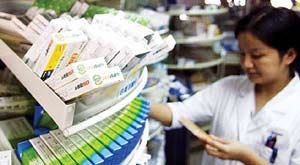Govt to give better access to low-price drugs
China Daily, April 16, 2014 Adjust font size:
A multidepartment effort has been introduced to give the public better access to commonly used medications at a relatively low price.
Eight government departments, including the National Health and Family Planning Commission, the National Development and Reform Commission, the China Food and Drug Administration, and the Ministry of Finance, have issued a notice on securing a supply of commonly used low-price drugs.
Zheng Hong, the NHFPC's drug administration chief, said: "A list of such drugs is expected to be publicized by June, and the producers of the drugs will be entitled to the right of pricing according to production costs and the market situation."
The price limit that the government places on commonly used drugs will be eliminated under the new initiative, Zheng added.
The initiative comes in response to a series of shortages of commonly used and low-price drugs. Last year, people suffering from hyperthyroidism began reporting that they had difficulty buying the low-price medicine Tapazole.
A 100-tablet bottle of the drug costs around 2.5 yuan (40 US cents) while similar imported ones are priced more than 10 times that.
Liu Fengying, from Ankang, Shaanxi province, said she is concerned about the supply of Tapazole.
"I have to be on the medication, otherwise symptoms like weight loss, hair loss, muscle aches, fatigue and anxiety will come back," said Liu, who was diagnosed with hyperthyroidism five years ago.
Ma Jin, a professor at the public health department of Shanghai Jiao Tong University, said the Tapazole shortage was caused by issues with the country's essential drug system.
Introduced in 2009 as part of a series of medical reforms, the system controls the pricing of more than 500 types of drugs to help ensure that the public has access to cheap, high-quality medications. But the price controls cut into companies' profits, and some stopped producing commonly used low-price medicine, Ma said.
Mao Qun'an, spokesman for the NHFPC, conceded that the essential drug system was somewhat to blame for the occasional drug supply shortages.
Under the new initiative, producers of the listed drugs will enjoy more freedom to price the medicine according to real situations like the cost and market demands, Zheng Hong said.
"It's a dynamic approach as a regular drug supply and price surveillance system will lead to the introduction of new drugs to the list and also remove some others," he said.
Market competition will be encouraged to help maintain the price of drugs, he added.


